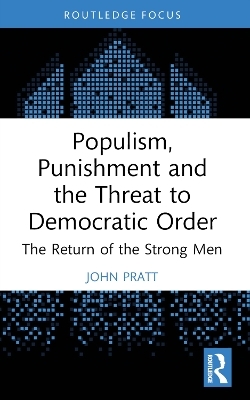
Populism, Punishment and the Threat to Democratic Order
The Return of the Strong Men
Seiten
2024
Routledge (Verlag)
978-1-032-20249-5 (ISBN)
Routledge (Verlag)
978-1-032-20249-5 (ISBN)
This book traces the rise of contemporary populism in Western democracies, marked by the return of would-be 'strong men' politicians. It seeks to make sense of the resultant nature, origins, and the remarkable spread of ideologies that express resistance to "facts," science, and expertise.
This book traces the rise of contemporary populism in Western democracies, marked by the return of would-be 'strong men' politicians. It seeks to make sense of the nature, origins, and consequences of their ascendancy—as expressed, for example, in the startling rise of the social movement surrounding Trump in the US, Brexit in the UK and the remarkable spread of ideologies that express resistance to ‘facts,’ science, and expertise.
Uniquely, the book shows how what began as a form of penal populism in the early 1990s transformed into a more wide ranging populist politics. This has had the potential to undermine or even overthrow the democratic order altogether. It examines the way in which the COVID-19 pandemic has impacted on these forces, arguing it threw the flailing democratic order an important lifeline, as Vladimir Putin has subsequently done with his war in Ukraine. The book argues that contemporary political populism can be seen as a wider manifestation of the earlier tropes and appeal of penal populism arising under neo-liberalism. The author traces this cross over and the roots of discontent, anxiety, anti-elites sentiment and the sense of being forgotten, that lie at the heart of populism, along with its effects in terms of climate denial, ‘fake news’, othering, nativism and the denigration of scientific and other forms of expertise. In a highly topical and important extension to the field the author suggests that the current COVID pandemic might prove to be an ‘antidote’ to populism, providing the conditions in which scientific and medical expertise, truth telling, government intervention in the economy and in health policy, and social solidarity, are revalorised.
Encompassing numerous subject areas and crossing many conventional disciplinary boundaries, this book will be of great interest to students and scholars of criminology and criminal justice, sociology, political science, law, and public policy.
This book traces the rise of contemporary populism in Western democracies, marked by the return of would-be 'strong men' politicians. It seeks to make sense of the nature, origins, and consequences of their ascendancy—as expressed, for example, in the startling rise of the social movement surrounding Trump in the US, Brexit in the UK and the remarkable spread of ideologies that express resistance to ‘facts,’ science, and expertise.
Uniquely, the book shows how what began as a form of penal populism in the early 1990s transformed into a more wide ranging populist politics. This has had the potential to undermine or even overthrow the democratic order altogether. It examines the way in which the COVID-19 pandemic has impacted on these forces, arguing it threw the flailing democratic order an important lifeline, as Vladimir Putin has subsequently done with his war in Ukraine. The book argues that contemporary political populism can be seen as a wider manifestation of the earlier tropes and appeal of penal populism arising under neo-liberalism. The author traces this cross over and the roots of discontent, anxiety, anti-elites sentiment and the sense of being forgotten, that lie at the heart of populism, along with its effects in terms of climate denial, ‘fake news’, othering, nativism and the denigration of scientific and other forms of expertise. In a highly topical and important extension to the field the author suggests that the current COVID pandemic might prove to be an ‘antidote’ to populism, providing the conditions in which scientific and medical expertise, truth telling, government intervention in the economy and in health policy, and social solidarity, are revalorised.
Encompassing numerous subject areas and crossing many conventional disciplinary boundaries, this book will be of great interest to students and scholars of criminology and criminal justice, sociology, political science, law, and public policy.
John Pratt is Emeritus Professor of Criminology at Victoria University of Wellington, New Zealand. His research interests are in the areas of the sociology and history of punishment, and criminological and social theory, and comparative penology. Professor Pratt has published extensively in these areas, including 'Law, Insecurity and Risk Control' (2020); 'Contrasts in Punishment. An Explanation of Anglophone Excess and Nordic Exceptionalism (2013, with Anna Eriksson); Penal Populism (2007); 'Punishment and Civilization' (2002)
Acknowledgements
1 The Return of the Strong Men
2 Penal Populism and Public Protection
3 The Rise of Populist Politics
4 COVID-19 as an Antidote to Populism
5 Fragile Reprieve
ReferencesIndex
| Erscheinungsdatum | 17.05.2023 |
|---|---|
| Reihe/Serie | Routledge Studies in Crime and Society |
| Verlagsort | London |
| Sprache | englisch |
| Maße | 138 x 216 mm |
| Gewicht | 210 g |
| Themenwelt | Geisteswissenschaften ► Philosophie |
| Recht / Steuern ► EU / Internationales Recht | |
| Recht / Steuern ► Strafrecht ► Kriminologie | |
| Recht / Steuern ► Strafrecht ► Strafverfahrensrecht | |
| Sozialwissenschaften ► Politik / Verwaltung ► Politische Systeme | |
| ISBN-10 | 1-032-20249-1 / 1032202491 |
| ISBN-13 | 978-1-032-20249-5 / 9781032202495 |
| Zustand | Neuware |
| Informationen gemäß Produktsicherheitsverordnung (GPSR) | |
| Haben Sie eine Frage zum Produkt? |
Mehr entdecken
aus dem Bereich
aus dem Bereich
klare Antworten aus erster Hand
Buch | Softcover (2023)
UTB (Verlag)
CHF 27,85


